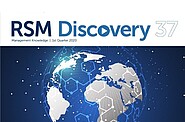Profile
Rodrigo Belo is Associate Professor at the Department of Technology and Operations Management at Rotterdam School of Management of the Erasmus University.
Rodrigo's research focuses on the effects of information systems on organizations and on the impacts of social network structures and peer influence on consumer behavior. His work has been published in top journal and peer-reviewed conferences such as Management Science, Marketing Science, and MIS Quarterly. Rodrigo has lead and collaborated in multiple projects with established firms and startups in the online and telecommunications sectors. His engagements include the design and deployment of large-scale real world randomized experiments to assess the effectiveness of marketing campaigns and to optimize online user engagement.
Rodrigo holds a PhD in Technological Change and Entrepreneurship from Carnegie Mellon University, an MSc in Engineering and Public Policy from Carnegie Mellon University, and a BSc in Computer Science and Engineering from Instituto Superior Técnico, University of Lisbon. Before joining the academia Rodrigo worked as a software engineer and analyst in the transportation and government sectors.
Publications
Article (11)
Academic (10)
-
Ghiassi-Farrokhfal, Y., Crisostomo Pereira Belo, R., Hesamzadeh, M. R., & Bunn, D. (2023). Optimal Electricity Imbalance Pricing for the Emerging Penetration of Renewable and Low-Cost Generators. Manufacturing and Service Operations Management, 25(5), 1966-1983. https://doi.org/10.1287/msom.2021.0555
-
Frick, T., Crisostomo Pereira Belo, R., & Telang, R. (2023). Incentive Misalignments in Programmatic Advertising: Evidence from a Randomized Field Experiment. Management Science, 69(3), 1665-1686. https://doi.org/10.1287/mnsc.2022.4438
-
Belo, R., & Li, T. (2022). Social Referral Programs for Freemium Platforms. Management Science, 68(12), 8933-8962. https://doi.org/10.1287/mnsc.2022.4301
-
Belo, R., & Ferreira, P. M. (2022). Free-Riding in Products with Positive Network Externalities: Empirical Evidence from a Large Mobile Network. MIS Quarterly, 46(1), 401-430. https://doi.org/10.25300/MISQ/2022/14712
-
Li, T., & Crisostomo Pereira Belo, R. (2022). To Make a Profit, Dating Apps Must Leverage Data Differently. Harvard Business Review. https://hbr.org/2022/01/to-make-a-profit-dating-apps-must-leverage-data-differently
-
Zhang, X., Ferreira, P. M., Godinho de Matos, M., & Belo, R. (2021). Welfare properties of profit maximizing recommender systems: Theory and results from a randomized experiment. MIS Quarterly, 45(1), 1-28. https://doi.org/10.25300/misq/2021/14971
-
Belo, R., Godinho de Matos, M., Ferreira, P. M., & Reis, F. (2019). The Impact of Time Shifting on TV Consumption and Ad Viewership. Management Science, 65(7), 2947-3448. https://doi.org/10.1287/mnsc.2018.3084
-
Godinho de Matos, M., Ferreira, P. M., & Belo, R. (2018). Target the ego or target the group: Evidence from a randomized experiment in proactive churn management. Marketing Science, 37(5), 793-811. https://doi.org/10.1287/mksc.2018.1099
-
Belo, R., Ferreira, P. M., & Telang, R. (2016). Spillovers from Wiring Schools with Broadband: the Critical Role of Children. Management Science, 62(12), 3450-3471. https://doi.org/10.1287/mnsc.2015.2324
-
Belo, R., Ferreira, P. M., & Telang, R. (2013). Broadband in School: Impact on Student Performance. Management Science, 60(2), 265-282. https://doi.org/10.1287/mnsc.2013.1770
Professional (1)
-
Belo, R. (2016). The critical role of children and schools in internet adoption. RSM Discovery - Management Knowledge, 27(3), 20-22. http://hdl.handle.net/1765/93314
Conference proceeding (2)
Academic (2)
-
Wan, C., Belo, R., Zejnilović, L., & Lavado, S. (2023). The Duet of Representations and How Explanations Exacerbate It. In L. Longo (Ed.), Explainable Artificial Intelligence - 1st World Conference, xAI 2023, Proceedings: First World Conference, xAI 2023, Lisbon, Portugal, July 26–28, 2023, Proceedings, Part II (1 ed., pp. 181-197). Springer Cham. https://doi.org/10.1007/978-3-031-44067-0_10
-
Wan, C., Crisostomo Pereira Belo, R., & Zejnilović, L. (2022). Explainability's Gain is Optimality's Loss? — How Explanations Bias Decision-making. In AIES 2022 - Proceedings of the 2022 AAAI/ACM Conference on AI, Ethics, and Society (pp. 778-787). Association for Computing Machinery. https://doi.org/10.1145/3514094.3534156
Courses
Big Data Management and Analytics
- Study year: 2023/2024, 2022/2023, 2021/2022, 2020/2021, 2019/2020, 2018/2019, 2017/2018, 2016/2017, 2015/2016
- Code: BM04BIM
- Level: ERIM, Exchange, IM/CEMS, Master
BIM Honours Class
- Study year: 2023/2024, 2022/2023, 2021/2022, 2020/2021, 2015/2016
- Code: BMHONBIM
- Level: Master
BIM Master Thesis
- Study year: 2023/2024, 2022/2023, 2021/2022, 2020/2021, 2019/2020, 2018/2019
- Code: BMMTBIM
- Level: Master
BIM Thesis Clinic
- Study year: 2023/2024, 2022/2023, 2021/2022, 2020/2021, 2019/2020
- Code: BMRM1BIM
- Level: Master
Past courses
IM Research clinic
- Study year: 2020/2021
- Code: BM-IM-RC
- Level: Master
IM Research clinic
- Study year: 2020/2021, 2019/2020
- Code: BM-IMRC
- Level: Master
Machine Learning & Learning Algorithms
- Study year: 2020/2021
- Code: BM05BAM
- ECTS: 4 Level: Master
Network Analytics
- Study year: 2020/2021
- Code: BM13BAM
- ECTS: 6 Level: Master
Network Data Analytics
- Study year: 2020/2021, 2019/2020, 2018/2019, 2017/2018, 2016/2017, 2015/2016
- Code: BMME014
- ECTS: 6 Level: Master, Master, Master, Master
BIM Research Methods I - Old style
- Study year: 2019/2020, 2018/2019
- Code: BM05BIM
- ECTS: 2
BIM Research Methods II - Old style
- Study year: 2019/2020, 2018/2019
- Code: BMRMBIM
- ECTS: 4
Featured on RSM Discovery
Helping managers understand the benefits of data analytics, big data, the Internet of Things, and artificial intelligence.





